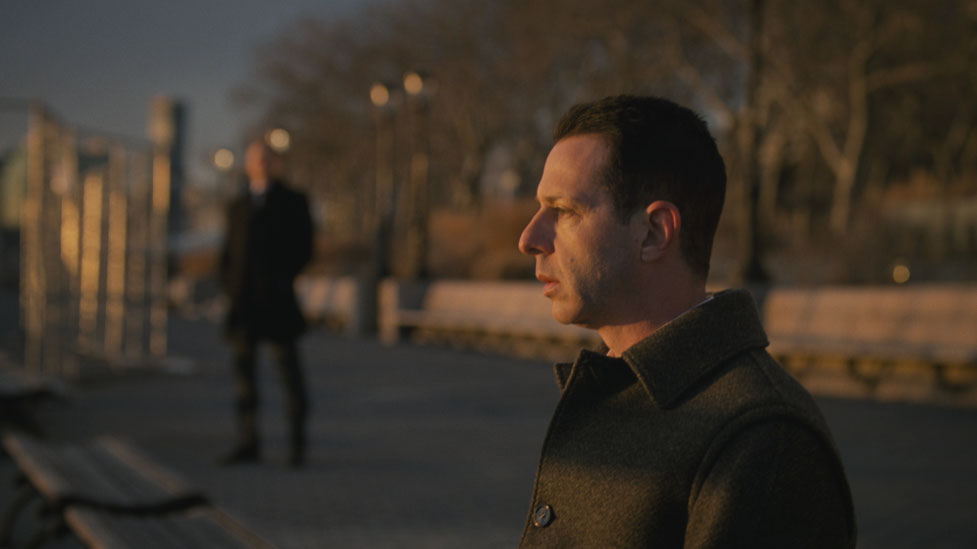
Kendall Roy faces an existential crisis in the "Succession" finale. Courtesy of HBO
Perhaps the saddest and most telling moment of the Succession finale takes place in a conference room where Kendall Roy, scion of the recently departed media mogul Logan Roy, begs his sister, Shiv, to sink a pending acquisition bid and let him take over their dad’s corporate empire instead.
Kendall has lived his entire life in anticipation of this moment. “I’m like a cog built for only one machine,” he says, pathetically. If he can’t do this, well, he’s useless.
After Shiv goes back to the boardroom to (spoiler alert) shiv her big bro, kid brother Roman Roy, the family snarkmeister, remarks to Kendall that all of the Roy siblings are “bullshit”—“we’re nothing.” They are four adult children rich beyond imagination, yet not one of them has ever really developed an identity distinct from their all-consuming father.
I recognized this malaise from the two years I spent talking with ultrawealthy people and their heirs and minions for my 2021 book about runaway wealth in America.
Great fortunes are experienced very differently by the wealth “creators” as opposed to those who stand to inherit. Imagine, if you will, growing up cocooned in a luxury realm where great things are expected of you, yet failure—and the learning that comes with it—is not allowed because appearances have to be maintained. Where a child’s accomplishments are viewed in reference to those of the patriarch. (It’s usually a man.) And where a massive pile of money serves as a tractor beam that keeps bickering relatives close, and from which it is hard to escape.
Even the eldest Roy sibling, Connor, who long ago abandoned any notion of following in his father’s footsteps, lives always in Logan’s shadow, foundering in the bubble his father’s wealth created and so detached from reality that he imagines he can make a meaningful bid for president.
One of my book sources was “Elizabeth,” a successful Silicon Valley executive who regularly crossed paths with extraordinarily wealthy people and had friends who stood to inherit large sums. “It cripples them as adults. It’s the same vibe with all of them,” she observed. Their lives “are very vague” and “it’s really tough on relationships with them. There’s just a kind of a blasé weirdness that affects the lives of people who know they’re going to inherit.”
We’re not even talking Roy-level wealth here. The same malaise afflicts families of much more modest means—if $30 million is modest. Another source, Michael, had to take a couple of years off from a late-bloomer PhD program after his ultrawealthy father died, just to get the family’s financial affairs in order. His dad was a pretty mean guy, not unlike Logan Roy, but he also plied Michael and his sister with privilege—a generous allowance, cars, a condo, a house—such that Michael never had to make his own go of it.
Perhaps counterintuitively, these handouts made him unhappy, and Michael dealt with his anxiety by spending well beyond his ample means—classic retail therapy—and running up credit card debt in a failed attempt to make himself feel better. His dad’s loveless largesse also complicated Michael’s relationship with his wife, who came from (actually) modest means—the marriage didn’t last.
On the 18th fairway at Pebble Beach, at the annual Concours D’Elegance classic auto show, I conversed with men proudly displaying Ferraris worth more than my house. Some were mid-tier entrepreneurs who had built up somewhat boring but also lucrative businesses. In tow were sons in their twenties and thirties, who, instead of pursuing their own passions, had opted to keep a hand in dad’s money machine. They’d convinced themselves that was the life they wanted, but I sensed that maybe it wasn’t.
Another source, an author I called Martha, had inherited wealth of such magnitude that she could easily have had a private jet, a chauffeured Bentley—any of that Lotto-fantasy stuff. Her fortune flowed from her late grandfather’s financial services firm, in which she’d had no involvement or knowledge whatsoever, and hitting this jackpot without effort had actually brought her much misery.
Martha had been raised way more modestly than she could have been—a privileged upper-middle-class existence—and for many years was able to remain in willful denial of her situation. When she finally, as a middle-aged woman soon to be married, became privy to all the details, she was floored. Even recalling that moment of revelation brought her to tears. “It’s shameful, and it makes me want to cry because this is the fantasy. I’ve got the fantasy in my fucking drawer,” she told me. “You’re going to be showered with gold. How can that be anything but the best news?”
Her vast wealth, with more to come, made her feel inauthentic and isolated. It also played a big role in the unraveling of her marriage. And it cushioned her from the financial struggles and trade-offs most families grapple with. Within her tight community of writer friends—with whom she didn’t discuss these wealth anxieties—she often felt like an imposter.
The absence of struggle, to most of us, seems pretty great. It’s kind of what we strive for, right? If we only had enough money socked away, we could do whatever we wanted and no longer be slaves to our often-frustrating day jobs. At the same time, our culture—indeed, our psychology—makes the absence of struggle a double-edged sword.
Jeff, a former Chicago-area attorney I interviewed for the book, retired from his law career in his forties after a string of parental passings left him and his wife with an unexpectedly large inheritance. “I’m in this in-between era around the margins of modern feminism, where men are valued based on their earning capacity,” he told me. “Am I doing something worthwhile if I’m not out there earning more money, building a reputation, and building a professional life?”
He’d experienced the same kind of vagueness Elizabeth described. “When you don’t have to earn money, it’s easy to change course. I was doing one thing for a while, then another thing,” he said. And although he never suffered from guilt, for the longest time he felt “unmoored.” When people would ask, as they always do, what he did, “I was uncomfortable talking about it,” Jeff recalled. “It was hard to talk about what I do without saying that I don’t have to work for money. I was always concerned about what people’s reaction would be. There was certainly self-esteem issues wrapped up in that. What were people going to think of me? Maybe what do I think about myself a little bit?”
It goes on. Another source, whom I called Jonathan, actually made his own fortune. He spent years working his butt off and sometimes flailing, but ultimately succeeded in building an online training company that he ended up selling—he cleared $40 million in the deal. Soon after, his mindset shifted from building an enterprise to protecting his wealth and worrying about all the ways he might lose it: “You’re fear-based now,” he told me.
He also feels like he’s living in a cage with gilded bars. His wife’s father, too, sold a company, leaving behind an even bigger fortune for his children. There was no going back, and however cushy Jonathan’s existence might seem to an outsider, he sorely misses the “great adventure” of life—just the normal, everyday struggles that feel overwhelming at times but help give us meaning.
In the world of the Roys, we saw plenty of debauchery. Indeed, excessive drinking and drug use, broken relationships, and mental health issues are all real-world hallmarks of children of wealth—not universal truths, but very common. There’s ample evidence, in fact, that children of high-income families are at equal or greater risk than their low-income counterparts on various measures of substance abuse and antisocial behaviors—even though it’s the poor kids we scapegoat and pathologize. (Children raised by middle-class parents are at the lowest risk in this regard.)
Such findings were a revelation to Suniya Luthar, who pioneered this line of inquiry as a young Yale psychologist and made it the focus of her career. “It was counterintuitive for me,” she said. “It would’ve never occurred to me to say kids like my kids are not just at as much risk, but potentially greater risk than those in poverty.”
In 2017, her team reported, for example, that a cohort of higher-income children the researchers had followed since middle school ended up being diagnosed with drug and/or alcohol addiction at rates twice to three times the national average. “There is a lot of pain, a lot of addictions and suicide” in wealthy communities, Luthar told me. And “a lot of these go unreported because obviously parents don’t want to broadcast that this kind of tragedy happened in their family.”
Tracy Gary recalls that her parents would polish off at least two bottles of scotch daily. They had a yellow Rolls-Royce, a private jet, a helicopter, and multiple estates, each with its own household staff. The riches came from the family’s midwestern telecom empire. Her parents didn’t work. Her mom was a socialite, and she and “Poppy,” technically her stepfather, would travel six months of the year, flitting among their estates and various charity functions, and leaving the care of Tracy and her brother to nannies and governesses.
Gary grew up surrounded by great wealth and privilege, but felt isolated, lonely, and entirely miserable. In 1965, when she was 14, before shipping her off to an exclusive Minnesota boarding school, her parents sat her down and informed her that she and her brother would be given $1 million each, which they would receive with interest at age 21. They were to do something productive with this money, she was told. Invested in the S&P 500 in 1965, that $1 million would be worth hundreds of millions today.
But Gary, who recognized the family wealth as the source of her unhappiness, did what the Roy children never could bring themselves to do. She pulled away from the tractor beam. Gary ended up giving away all of her inherited money and creating a series of women-focused foundations in the process. She’s not poor. She eats well, lives in a modest condo in upscale Tiburon, California, and makes a reasonable living advising wealthy families on philanthropy issues—giving away a large portion of those earnings to charity as well.
But she’s basically burned the family safety net, Gary told me, and she’s never been happier. Roy siblings take note.
















